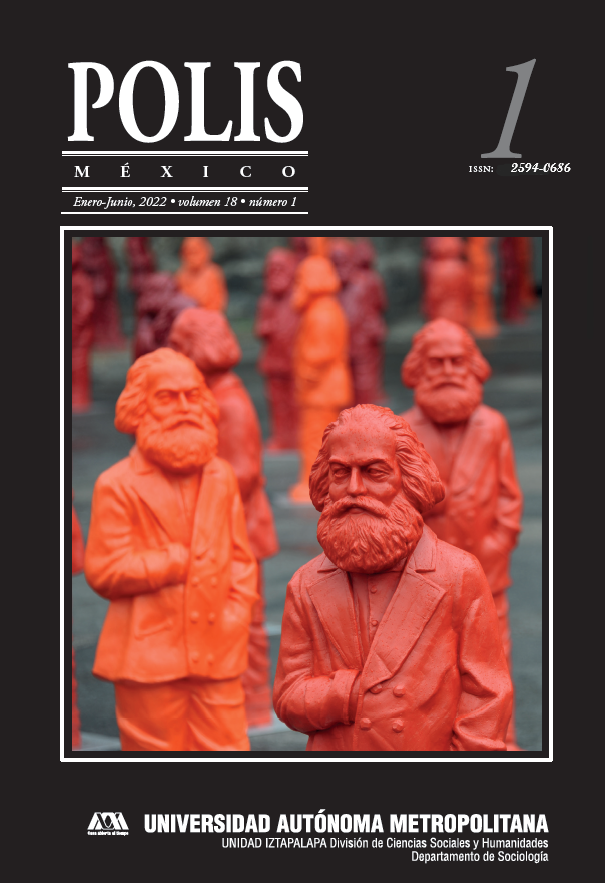TITO LIVIO Y MAQUIAVELO. ROME: FROM THE MONARCHICAL TO THE REPUBLICAN CONSTITUTION
DOI:
https://doi.org/10.24275/10.24275/uam/izt/dcsh/polis/2022v18n1/GarciaKeywords:
república, dictadura, cónsules, gobierno mixto, magistraturasAbstract
The republican theory of Machiavelli was built from multiple sources, ideas andauthors, among which the Roman historian Tito Livio stands out. Machiavelli wasessentially based on it, because one of the most important characteristics of hismethod of political analysis is the rescue of the teachings of history.One of the basic principles of Machiavelli’s republican theory is his inclinationfor a mixed government, a government in which all social sectors of the population participate, that is, elites and masses, or in their own terms, optimates and people.The articulation of the magistracies according to these principles of representation, as well as other characteristics of institutional design that Machiavelli extracted and deduced from the historical account of Tito Livio, is fundamental for his conception of a solid republican government.Downloads
References
Anderson, W. S. (1958). Livy and Machiavelli. The Classical Journal, 53(5), 232-235.
Andrés Santos, F. J. (2015). Roma. Instituciones e ideologías políticas durante la República y el Imperio. Madrid: Tecnos.
Aristóteles (2019). Política. Madrid: Alianza.
Balot, R. y Trochimchuk, S. (2012). The Many and the Few: On Machiavelli’s ‘Democratic Moment’. The Review of Politics, 74(4), 559-588.
Beard, M. (2006). SPQR. Una historia de la antigua Roma. México: Crítica.
Carty, J. A. (2016). Machiavelli´s Art of Politics: A Critique of Humanism and the Lessons of Rome. En G. C. Kellow y N. Leddy (Eds.). On Civic Republicanism. Ancient Lessons for Global Politics. Toronto: Toronto University Press.
Cicerón, M. T. (2014). La república. Madrid: Alianza.
Dionisio de Halicarnaso (1984). Historia antigua de Roma. I-III. Madrid: Gredos.
Gilbert, F. (1977). The Composition and Structure of Machiavelli’s Discorsi. En F. Gilbert. History: Choice and Commitment. Cambridge: Harvard University Press.
Grimal, P. (2005). El helenismo y el auge de Roma. México: Siglo XXI.
Grimal, P. (2005). La formación del Imperio Romano. México: Siglo XXI.
Grimal, P. (2007). La civilización romana. Barcelona: Paidós.
Heródoto (1976). Historias. México: UNAM.
Hexter, J.H. (1956). Seyssel, Machiavelli, and Polybius VI: The Mystery of the Missing Translation. Studies in the Renaissance, 3, 75-96.
Kalyvas, A. (2007). The Tyranny of Dictatorship: When the Greek Tyrant Met the Roman Dictator. Political Theory, 35 (4), 412-442.
Lintott, A. (2002). The Constitution of the Roman Republic. Oxford: Oxford University Press.
Maquiavelo, N. (2005). Discursos sobre la primera década de Tito Livio. Madrid: Alianza.
Maquiavelo, N. (2010). El príncipe. Madrid: Alianza.
Maquiavelo, N. (2013). Escritos de gobierno. Madrid: Tecnos.
McCormick, J. P. (2001). Machiavellian Democracy: Controling Elites with Ferocius Populism. The American Political Science Review, 95 (2), 297-313.
McCormick, J. P. (2012). Subdue the Senate: Machiavelli’s ‘Way of Freedom’ or Path to Tyranny? Political Theory, 40 (6), 714-734.
Mommsen, T. (2003). Historia de Roma. Madrid: Turner.
Murcia Ortuño, J. (2017). Esparta. Madrid: Alianza.
Pina Polo, F. (2019). La res pública romana: Instituciones y participación popular<http://anuariodehistoria.unr.edu.ar/ojs/index.php/Anuario/index>
Plutarco (2008). Vidas paralelas, Vol. II. Madrid: Gredos.
Plutarco (2014). Vidas paralelas, I. Madrid: Gredos.
Polibio (1982a). Historias, I. Madrid: Gredos.
Polibio (1982b). Historias, II. Madrid: Gredos.
Posner, E. A. (2010). The Constitution of the Roman Republic: A Political Economy Perspective. University of Chicago Public Law & Legal Theory Paper, 327.
Richardson, B. (1972). The Sctructure of Machiavellis’s Disocrsi. 49 (4). 460-471.
Richardson, J. H. (2014). ’First’ and the Historians of Rome. Historia: Zeitschrift fur Alte Geschichte, 63 (1), 17-37.
Sasso, G. (1980). Niccoló Machiavelli. Bologna: Il Mulino.
Schmitt, C. (2007). La dictadura. Madrid: Alianza.
Sherberg, M. (1991). The problematics of reading in Machiavelli’s ‘Discourses’ Modern Pholology, 89 (2), 175-195.
Spinosa, A. (2000). La grande storia di Roma. Milano: Mondadori.
Tito Livio (1990a). Historia de Roma desde su fundación. I-III. Madrid, Gredos.
Tito Livio (1990b). Historia de Roma desde su fundación. IV-VII. Madrid: Gredos.
Tito Livio (1990c). Historia de Roma desde su fundación. VIII-X. Madrid: Gredos.
Urbinati, N. (2012) Competing for Liberty: The Republican Critique of Democracy. The American Political Science Review, 106 (3), 607-621.
Walbank, F. W. (1943). Polybius on the Roman Constitution. The Classical Quarterly, 37(3-4), 73-89.



